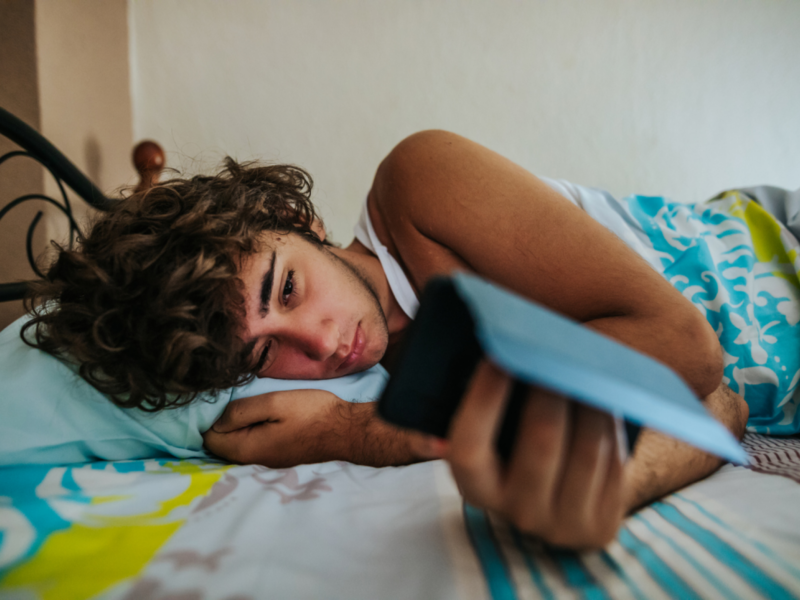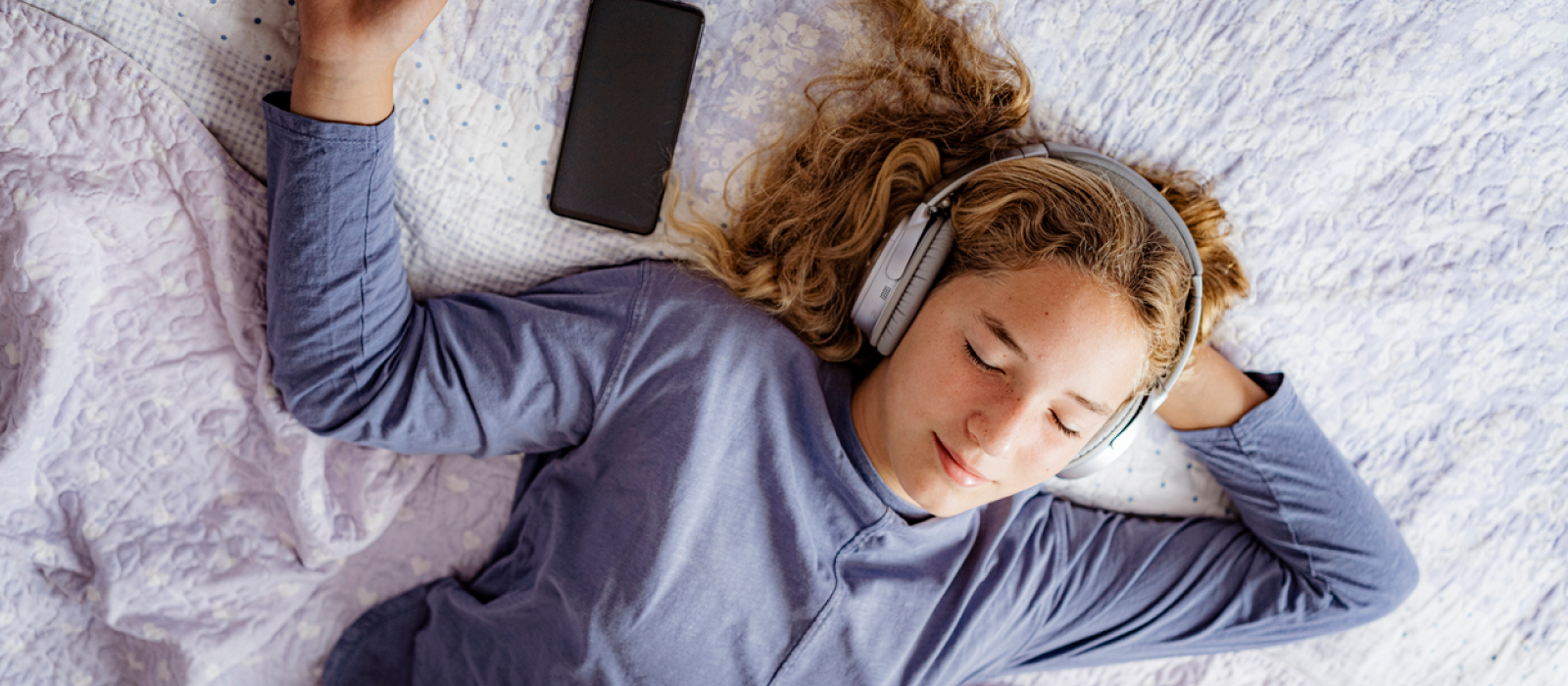
Table of Contents
Why Am I More Depressed at Night?

Written By: Ethan Cohen BSN, RN

Clinically Reviewed By: Dr. Don Gasparini
Updated: December 4, 2023
5 min.
It's common for symptoms of depression to worsen at night. This article explores why and offers some helpful tools to help combat nighttime depression.
Learn more about our Clinical Review Process
Table of Contents
Depression is one of the most common mental health conditions in the United States, according to studies, but its effects are known to ebb and flow. Symptoms like low mood and irritability can come and go during different times of the year or even different parts of the day, with many people reporting depressive symptoms worsening at nighttime. Feeling more depressed at night can cause fatigue, exacerbating symptoms of depression and creating a dangerous cycle. Below, we delve into why people feel more depressed at night and provide tips to manage nighttime depression.

Learn skills to cope with nighttime depression
Personalized treatment plans, virtual intensive therapy.
Causes of feeling depressed at night
As mentioned, many people with depression experience an increase in the severity of their symptoms at night. Research suggests that this nighttime symptom worsening is due to a combination of lifestyle choices, personal biology, and brain chemistry. Below, we delve into the question that so many with depression ask: Why am I depressed at night?
Mood and the circadian rhythm
People show a wide range of physiological changes throughout the 24 hours of a day, regulated by the body’s internal biological clock, known as the circadian rhythm. The circadian rhythm regulates physiological and behavioral processes, like the sleep-wake cycle, and is linked to mood. Specifically, mood increases with the rise of core body temperature, which begins in the morning and peaks in the late afternoon before dropping to its lowest at night. If you are prone to depressive symptoms, this end-of-day mood drop can bring you even lower, increasing the seriousness of your depressive symptoms.
Alterations in the sleep-wake cycle
As mentioned, disruptions to the natural circadian rhythm can contribute to mood changes. Specifically, irregular sleep patterns, like staying up late or bouts of insomnia and sleep deprivation, may negatively impact your mood. Research suggests that night owls are more likely to experience psychological disturbances than early risers. This is exemplified by a study finding that people working night shifts or irregular schedules, which disrupt their sleep patterns, may have a higher likelihood of experiencing depression compared to those with traditional 9-to-5 jobs.

Depression Extends Beyond the Mind: Physical Symptoms of Major Depressive Disorder
Charlie Health Editorial Team
Isolation
For many people, bedtime is a time of solitude. Feelings of loneliness or lack of social connection may become more pronounced during these quieter hours, contributing to depressive feelings. There is a great deal of research to suggest that social isolation can negatively affect mental health and well-being, including being linked to increased depression.
Rumination
Many people have had the experience of laying in bed at night and not being able to fall asleep due to racing thoughts. For those with depression, this experience is sometimes commonplace. Research shows that rumination (thinking about negative thoughts) plays a crucial role in the link between depressed mood, sleep, and health. Also, as rumination involves overthinking about stressors and negative thoughts, it may intensify feelings of depression during the night.
5 tips for how to cope with depression at night
Coping with depression at night can be challenging, but there are strategies that may help improve your mood and well-being. Keep in mind that individual experiences with depression vary, and it’s essential to find what works best for you. Here are some tips that might be helpful for coping with depression at night:
1. Improve sleep hygiene
Getting consistent quality sleep can help stave off the cycle of nighttime depression fatigue, a vicious cycle between depression symptoms and sleep problems. Thankfully, there are evidence-based sleep habits (sometimes referred to as “sleep hygiene”) that you can take to improve sleep. Some of the best tips, according to the Centers for Disease Control and Prevention (CDC), are as follows:
- Be consistent. Go to bed at the same time each night and get up at the same time each morning, including on the weekends.
- Make sure your bedroom is quiet, dark, relaxing, and at a comfortable temperature.
- Remove electronic devices, such as TVs, computers, and smartphones, from the bedroom (more on this below).
- Avoid large meals, caffeine, and alcohol before bedtime.
- Get some exercise. Being physically active during the day can help you fall asleep more easily at night.
2. Limit blue light exposure
Many people turn to their phones when they are having difficulty falling asleep in bed or feeling particularly lonely or depressed at night. However, countless studies have shown that pre-bedtime exposure to blue light, the type of light emitted by your phone and other screen-based devices, negatively affects your ability to fall asleep and can cause many other health consequences. Also, excessive mobile phone use has been linked to symptoms of depression and anxiety. So, even though you may feel inclined to jump on social media while lying in bed feeling lonely and depressed, it’s important to resist the urge. The National Sleep Foundation recommends cutting off screen time at least 30 minutes before bedtime. Instead of scrolling endlessly, consider reading a book or doing a crossword puzzle.
3. Make evening plans with loved ones
Although depression can drive people to isolate themselves from loved ones and once-enjoyed activities, it can be helpful to reach out to trusted loved ones for support. Specifically, getting together with friends or family can help stave off the isolation and loneliness linked with depression, which may otherwise be exacerbated at nighttime. Consider cooking dinner with a friend, talking with a family member on the phone, or going on a walk with a loved one after work or school. Even a small activity can hopefully help you recognize that you are not alone and that you have a support system.
4. Practice mindfulness
Mindfulness practices can be a helpful tactic for managing rumination and improving your mood and sleep. This could entail writing down affirmations in a journal during the day so that you can look back on them if nighttime rumination strikes. You can also practice meditation or deep breathing exercises—mindfulness practices that have been shown to reduce nighttime stress and improve sleep.

5. Know when to seek professional help
If your depression is persistent and impacting your daily life, consider seeking help from a mental health professional. Therapy and medication can be valuable components of depression treatment, and you don’t have to handle nighttime depression by yourself. With the right treatment program, depression is highly treatable.
Get support for depression at Charlie Health
If you’re struggling with depression or depression symptoms, Charlie Health is here to help.
Our virtual Intensive Outpatient Program (IOP) offers more than once-weekly support for teens and adults with serious mental health conditions, including those dealing with severe depression, postpartum depression, or other mood disorders like bipolar disorder. Charlie Health’s expert clinicians can craft a personalized treatment plan to address your specific depression symptoms. All of our plans involve a combination of individual therapy, family therapy, and group sessions.
Fill out our short form to learn more about Charlie Health and get started today.
References
https://www.sleepfoundation.org/teens-and-sleep/screen-time-and-insomnia-for-teens
https://pubmed.ncbi.nlm.nih.gov/30395300/
https://www.health.harvard.edu/staying-healthy/blue-light-has-a-dark-side
https://www.cdc.gov/sleep/about_sleep/sleep_hygiene.html
https://www.ncbi.nlm.nih.gov/pmc/articles/PMC4362854/
https://www.apa.org/monitor/2019/05/ce-corner-isolation
https://www.hmpgloballearningnetwork.com/site/pcn/article/shift-work-tied-poor-mental-health
https://journals.plos.org/plosone/article?id=10.1371/journal.pone.0230169




